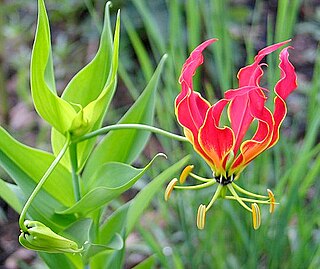Related Research Articles

Gloriosa is a genus of 12 species in the plant family Colchicaceae, and includes the formerly recognised genus Littonia. They are native in tropical and southern Africa to Asia, and naturalised in Australia and the Pacific as well as being widely cultivated. The most common English names are flame lily, fire lily, gloriosa lily, glory lily, superb lily, climbing lily, and creeping lily.

Colchicaceae is a family of flowering plants that includes 15 genera with a total of about 285 known species according to Christenhusz and Byng in 2016.

Yucca gloriosa is a species of flowering plant in the family Asparagaceae, native to the southeastern United States. Growing to 2.5 m (8 ft), it is an evergreen shrub. It is widely cultivated as an ornamental for its architectural qualities, and has reportedly become established in warmer climates in the wild in various parts of the world.

Yucca gloriosa var. tristis, known as curve-leaf yucca, curved-leaved Spanish-dagger or pendulous yucca, is a variety of Yucca gloriosa. It is often grown as an ornamental plant, and is native to the southeastern United States, from coastal southeastern Virginia south through Florida and west to Texas. In contrast to Y. gloriosa var. tristis, the leaves of Y. gloriosa var. gloriosa are hard stiff, erect and narrower.

Laglorieuse is a commune in the Landes department in Nouvelle-Aquitaine in south-western France.

Águia Vitória is the mascot of Portuguese football club S.L. Benfica. Before every Benfica match at the Estádio da Luz, the eagle flies around the stadium and eventually lands on top of the club's crest without the eagle symbol, completing it.

Gloriosa superba is a species of flowering plant in the family Colchicaceae. Common names include flame lily, climbing lily, creeping lily, glory lily, gloriosa lily, tiger claw, agnishikha and fire lily.
Aprominta aga is a moth of the family Autostichidae. It is found on the Aegean Islands and in Turkey.
Aprominta aperitta is a moth of the family Autostichidae. It is found on the Aegean Islands.
Aprominta argonauta is a moth of the family Autostichidae. It is found on Crete.
Aprominta atricanella is a moth of the family Autostichidae. It is found in Bulgaria, North Macedonia and Greece.
Aprominta bifasciata is a moth in the family Autostichidae. It is found in Greece and Turkey.
Aprominta cryptogamarum is a moth of the family Autostichidae. It is found in France, Italy and Spain.
Aprominta designatella is a moth of the family Autostichidae. It is found in Albania, Bosnia and Herzegovina, Croatia, Serbia, Bulgaria, Romania, North Macedonia, Greece, Russia and Turkey.
Aprominta pannosella is a moth of the family Autostichidae. It is found in Greece.
Aprominta reisseri is a moth of the family Autostichidae. It is found on Crete.
Aprominta tectaphella is a moth of the family Autostichidae. It is found on Crete.
Aprominta separata is a moth of the family Autostichidae. It is found on Crete.
Aprominta xena is a moth of the family Autostichidae. It is found on Crete.

Aprominta is a Palearctic moth genus in the family Autostichidae. One species Aprominta australis Gozmány, 1966 is Afrotropical.